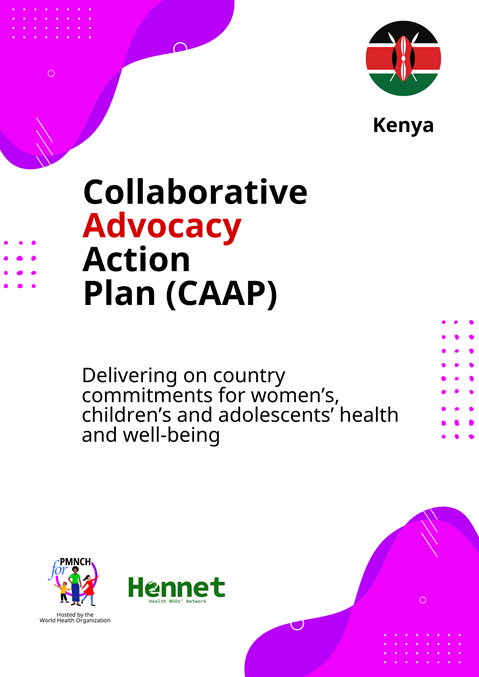Kenya Collaborative Advocacy Action Plan
CAAP

Overview
The development of the advocacy action plan was coordinated by Health NGO Network (HENNET).
The Kenya CAAP initiative aims to enhance coordinated, partner-led advocacy that strengthens the implementation of existing Maternal, Newborn, and Child Health (MNCH), Sexual and Reproductive Health and Rights (SRHR), and Adolescent Well-Being (AWB) commitments.
Kenya is one of 10 countries in sub-Saharan Africa that have collaborated with the PMNCH under the CAAP initiative.
The advocacy plan is a living document to rally the advocacy efforts of partners, evolving as progress is made and as country priorities evolve. It leveraged the findings from a recent review of national commitments and feedback from discussions with organizations working on women’s, children’s and adolescents’ health, government representatives, and community groups among other stakeholders. These included youth, media, and Civil Society Organizations (CSOs) and sub-national Community-Based Organizations (CBOs).
Together, partners have identified the following five goals to advance advocacy and accelerate progress for women’s, children’s and adolescents’ health:
End preventable Maternal, Perinatal, Neonatal, and Child Mortalities: Advocate for urgent, accelerated action to end preventable maternal, perinatal, neonatal, and child mortalities, including stillbirths, by 2030.
Strengthen adolescent and youth-responsive health systems and end teenage pregnancy: Advocate for the integration of youth-responsive health services in line with the National Guidelines for Provision of Adolescent Youth Friendly Services (YFS) Kenya and reduce teenage pregnancy from 15% to 10% by 2027.
Reduce unmet family planning needs: Reduce unmet family planning needs to at least to 10% for all women, married and unmarried and ensure commodity availability.
Increase domestic financing for health and RMNCAH at national and county levels: Advocate for the Government to honour the Abuja declaration to allocate 15% of the national budget towards health. Within the national health budget and county health budgets RMNCAHN allocation to desegregated and include 100% domestic financing for family planning commodities.
Strengthen and disaggregate RMNCAHN Data: Improve national, county, and sub-county data quality by ensuring data disaggregation by gender and age by 2028 to enable-responsive health programming.
Aligned with initiatives including the Every Woman Every Newborn Everywhere (EWENE) and Child Survival Action (CSA) and ongoing advocacy of the Global Leaders Network for Women’s, Children’s and Adolescents’ Health (GLN), the plan’s success depends on collaborative and coordinated efforts of partners. Stakeholders are invited to engage in advocacy actions to advance the health and rights of women, children, and adolescents—leaving no one behind.
Learn more on our work in Kenya: here

.png?sfvrsn=6d0e27cd_1)



